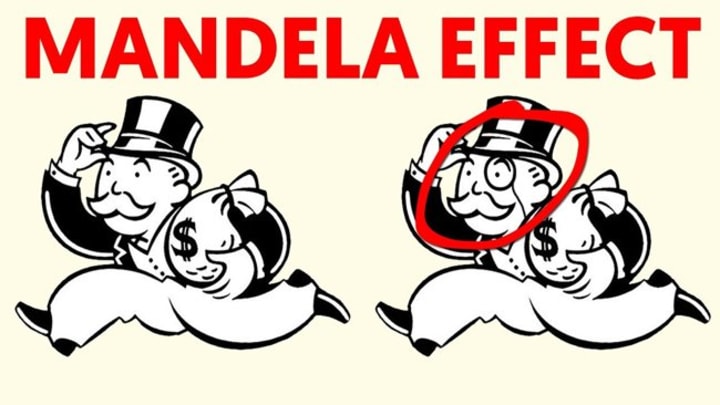It's Time to Kill "The Mandela Effect"
The clickbait meme is quickly replacing the incredible man who inspired it and this needs to stop now.

So, it turns out, the Mandela Effect, is not a real thing. In this article, I will examine the various ways that the Mandela Effect is either A) a massive troll job or B) that it is simply a made up construct intended to garner a few clicks on YouTube. Either way, however you come down on this discussion—trolling or simple effrontery—you will hopefully come away knowing full well that the charlatans who continue to push this falsity are working from a made up construct.
What is the Mandela Effect?
In 1990, many people came to believe that South African peace activist Nelson Mandela had died in prison. Indeed, if you ask, there are people who will tell you they have a distinct memory of a vigil outside of Mandela’s South African prison where, from time to time, over the years, Mandela would reach a bony hand through the bars and wave at the well-wishers and fellow activists who continuously rallied for his release.
In fact, what people are really remembering is the day that Nelson Mandela was released from Victor Verster Prison, February 11, 1990. Through some strange game of pop culture telephone—I will explain that reference in a moment, it’s a theses of this article. People who perhaps weren’t paying full attention, or just simply too young for the actual memory to take hold, came to the belief that the joyous, celebratory, gathering outside of Victor Verster Prison was a sad occasion and that the many tributes to Mandela that day were out of grief rather and celebration.
History, of course, records that not only was Nelson Mandela not dead on that day in 1990, he was triumphantly released from prison and immediately returned to his activism—activism that eventually led to the end of Apartheid and his becoming the first Black President of South Africa in 1994, less than four years from his release from jail. Oh, he also happened to win the Nobel Peace Prize the year before becoming the South African President. One more thing: More than one billion people watched when Mandela won the South African Presidency.
I mention all of this because the Mandela Effect is an insidious and negligent thing to attach to a man of Nelson Mandela’s standing. A full generation of people now coming of age via YouTube are finding out who Nelson Mandela was in the same offensively sideways, half-paying attention way that so many people came to believe that he had actually died on that legendary day, February 11, 1990, when his freedom became the symbol of freedom of millions around the world.
LOL did Mandela actually die only to be saved by time travelers?
Let me preface this portion of the article by stating that the tiny subset of YouTubers who posit the "time travel explains The Mandela Effect" theory are only kidding or trolling. That fact doesn’t make me any less annoyed that these wannabe comedians are using the legacy of Nelson Mandela to play their idiotic, clickbaiting trollery. No one actually believes that time travel is real and that Nelson Mandela died only to have a time traveler, ala Sam Beckett on Quantum Leap, go back in time to rescue Mandela and accidentally, in the process, create the false memory of Mandela’s 1990 death.
The line between satire and simply taking advantage of simple minded rubes for clickbait dimes is a very thin one. For every video that toys with the time travel Mandela Effect theory as kooky fun, there is the overly serious video that disingenuously fakes a belief in something supernatural in order to capitalize on the sad, poor souls who desperately want to believe that such things are possible.
Making Something Out of Nothing
One such video that toes the line between haha, how silly is this theory, and boy wouldn’t that be cool, gee whiz what about time travel(?) wakka wakka, is by a channel called Edge of Wonder. Edge of Wonder is a bizarre channel that has more recently moved on to lengthy videos about the Deep State—whatever the hell that is. Edge of Wonder discovered the Mandela Effect about a year ago, and when their videos began getting over a million views, they started cashing in with a series of Mandela Effect videos.
They don’t subscribe to the Time Travel theory, but they aren’t entirely dismissive of it either. Mostly, they are just irritatingly forcing the Mandela Effect theory into places where it doesn’t belong, such as whether the show Sex and the City was actually called Sex in the City. It’s Sex and the City, it always was, and only laziness and lack of attention had people calling it Sex in the City. This type of mishearing of a single word somehow passes as proof for the Edge of Wonder presenters that the Mandela Effect is a real thing.
Another irksome and poorly misinformed example that Edge of Wonder cites is the famour Forrest Gump line of dialogue: “Life was like a box of chocolates.” The hosts are dumbfounded that Forrest’s legendary quote is not “Life IS like a box of chocolates.” There is a lengthy and embarrassing scene in the video where the hosts ridicule the movie for saying "Was" instead of "Is," because in their mind, the past tense makes no sense.
For the record, though Forrest was mentally challenged as a character, his past tense for the quote has perfectly rational context. Forrest was quoting his late mother (played by Sally Field). It’s perfectly natural that since Mama Gump had passed away as of the time Forrest was relating this quote, that he would place her quote in past tense. But this is far too much contextual effort for clickbait YouTubers apparently.
The Mandela Effect is not real.
When I was in fourth grade, my teacher, Mrs Stevens, had us play a game that she called "Telephone." In this game, she would whisper a phrase into the ear of a student seated next to her. That student would attempt to whisper that same phrase in the ear of the person next to them and it would go on like that through a dozen or so kids until we got to the end.
Then, Mrs Stevens would ask the last student what the original phrase was. Naturally, by that time, what she had said had become misshapen, misheard, and generally misremembered into something incomprehensible and often quite funny. It was especially when she would reveal the mundane actual phrase that the game had began with.
Essentially, the Mandela Effect can be dismissed as a simple game of pop culture telephone. Instead of one person hearing Darth Vader say, “No, I am your father,” when talking to Luke Skywalker in Empire Strikes Back, millions heard it and then, when they tried to imitate it back to friends and family later, it became, “Luke, I am your father.” This isn’t pop culture amnesia or time travel, it’s perhaps the easiest to understand and accept phenomenon imaginable: Pop culture telephone.
I intended to stop with that paragraph as I do feel it is a strong closer, but I wanted to address what has become the pop culture flashpoint of the Mandela Effect: Shazam. No, not the new DC Universe action-comedy comic book movie, arriving in theaters in April of 2019. No, Shazam, the supposed mid-1990s comedy vehicle in which comedian Sinbad played a genie.
A large subsection of the internet troll universe, as well as the legitimately confused, believe Sinbad starred in a genie movie. They claim to have a distinct memory of it all the way down to the box art. This never happened. In 1996, basketball star Shaquille O’Neal portrayed the title character in a family comedy called Kazaam. Kazaam is an oversized, comic, wish-granting genie in full genie regalia, turban, and hammer pants, in all of their offensive and stereotypical grandeur.
One man has become internet famous for his assertion that when he worked at a video store all of the copies of Shazam over time became Kazaam, but he knows in his heart, Shazam existed. It did not. His memory is quite simply conflating Kazaam with the series of movies that comedian and actor Sinbad released at that same time. Kazaam arrived on home video at the time that Sinbad’s First Kid and Jingle All the Way arrived on home video.
Having worked at a video store at that time myself, I can say, Sinbad was inescapable, especially in Jingle All the Way, which played on a holiday loop when it arrived on home video. It’s not a stretch to assume that because Kazaam and Sinbad’s two other movies arrived at the store at almost the same time, that this guy simply crossed it all up in his mind. Recall, he is recounting a 20-year-old memory of a time when he worked in the tedious field of rewinding videotapes. The mind, he plays tricks on ya.
It really is just that simple. So, can we please start remembering Nelson Mandela for the reasons we should remember him and not this regressive internet memery?
About the Creator
Sean Patrick
Hello, my name is Sean Patrick He/Him, and I am a film critic and podcast host for the I Hate Critics Movie Review Podcast I am a voting member of the Critics Choice Association, the group behind the annual Critics Choice Awards.






Comments
There are no comments for this story
Be the first to respond and start the conversation.